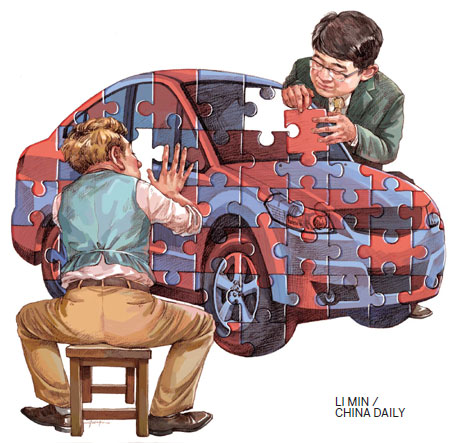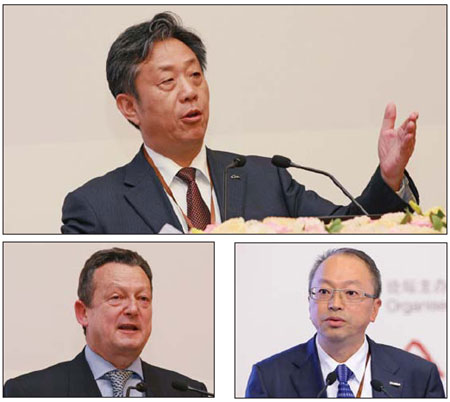Hybrid challenge
Updated: 2012-11-30 06:44
By Wang Chao (China Daily)
|
||||||||

Shifting paradigms force auto joint ventures to focus more on 'made-in-China for China' vehicles
For three decades joint-venture auto companies have ruled the roads in China - with the foreign partner providing the weight of well-known brands and technology and the domestic partner contributing with human resources, production facilities and local knowledge. But a new equation has entered into the relationship: "Made in China for China" vehicles with government encouragement. More and more of these foreign joint ventures are looking to have their own China identity in the form of hybrid variants, rather than piggy-back on the foreign brand to grow sales.
The hybrid brands have not only forged their own IPR, but also capitalized on the strengths of the joint venture partners and used the government incentives to create their own niche in the automobile market. During the first 11 months of the year, out of the 150 new car models that were launched, 74 were China-born brands with a few hybrid variants. Every auto JV worth its salt has launched hybrid vehicles in China to take advantage of this market.
|
||||
One reason why the hybrid race appears to be appealing for most of the auto majors is that the products are mainly targeted at the lower end customers, who also account for the lion's share of the market.
Unlike the high-end market where looks and brand name makes the difference, the tipping points in the low, mid and hybrid segments of the market are the pricing and performance, especially factors like fuel efficiency and after-sales service.
|
Clockwise from top: Dong Yang, vice-chairman of China Association of Automobile Manufacturers; Ma Jun, vice-president of Chang'an Automobile; Ivan Hodac, secretary-general of European Automobile Manufacturers Association. Photos Provided to China Daily |
Fundamental choice
From a company perspective, having such variants makes sense as they do not put pressure on the existing production lines and can be easily rolled out from platforms that became obsolete after product upgrades.
The trusted and mature production platforms also make it easier for the companies to achieve a higher degree of localization and lower overall costs. Besides, the brands also use the existing distribution network and after-sales services of the joint venture, another factor that helps bring down the overall costs.
Auto industry experts, however, feel that the hybrid trend is an indication that foreign joint ventures are now looking to expand into the lower end of the auto market dominated by Chinese brands like Geely and Chery. The experts feel that it would only be a matter of time before these brands wrest market share from the independent Chinese brands.
Dong Haiyang, vice-president of BAIC, China's fifth-largest auto maker by sales, says that independent auto brands owned by the joint ventures will cannibalize sales from Chinese brands due to their advantages.
Su Bo, vice-minister of industry and information technology, however, feels that hybrid brands have a place in the overall auto market. "Innovation in the auto industry should not be limited to Chinese brands, but include everything that is happening in the industry," he says.
"Only by doing this can we form an equal environment for fair competition and therefore reinforce the innovation skills of Chinese enterprises. If we exclude the foreign partner who contributes to over 80 percent of the investment, it will be a waste of resources."
Having witnessed the ups and downs of the Chinese auto market, many of the joint-venture partners have often found themselves in fricky situations.
The Chinese partner has often found that it did not get access to the cutting-edge technologies from the foreign partners as expected, but instead ended up losing considerable market share to the foreign brand. The foreign partners have found that increased governmental regulation is denting profit margins.
At the same time, China has also become an increasingly important battlefield that foreign brands cannot afford to lose, as it is one of the few oases in a global marketplace that resembles a desert.
Recent estimates indicate that auto sales in Europe this year will not exceed 12.5 million units, the second worst year in the past 20 years.
Ivan Hodac, secretary-general of the European Automobile Manufacturers Association, says that "nobody makes money today in Europe", and the European market shows no signs of picking up next year. "The only companies that are still doing well are companies in the export market (overseas markets), such as Volkswagen, BMW and Daimler."
But in China, the auto industry is still on a roll. Although the growth rate has slowed from 40 percent in 2009 to around 10 percent, it is still the most important engine for foreign brands.
Chen Qingtai, research fellow at the China Development Research Center of the State Council, says that the average car ownership in China is 60 among every 10,000 persons, one-tenth the ratio of that in Japan, and one-sixth of South Korea.
"With spending power increasing rapidly, the ownership rate in China is set to grow further," he says.
However, most of the foreign automobile companies feel that favorable policies are fast diminishing. Multinational companies are no longer treated as honored guests, but as equal market entities.
Last year, the Ministry of Commerce and the National Development and Reform Commission had indicated that it would no longer encourage foreign investment in the auto sector, but instead push for foreign investment in technologies for the new energy sector.
Song Jian, executive vice-president of Tsinghua Automotive Engineering Institute, says developing new joint-venture brands is one sure way for the foreign brands to regain government support. "The government has sent a clear signal that it will support the new joint-venture brands, as long as the foreign party can contribute something valuable to the Chinese side."
Once the products are defined as Chinese brands, they can enjoy privileges such as government purchases and financial support for research and development, Song says.

 Relief reaches isolated village
Relief reaches isolated village
 Rainfall poses new threats to quake-hit region
Rainfall poses new threats to quake-hit region
 Funerals begin for Boston bombing victims
Funerals begin for Boston bombing victims
 Quake takeaway from China's Air Force
Quake takeaway from China's Air Force
 Obama celebrates young inventors at science fair
Obama celebrates young inventors at science fair
 Earth Day marked around the world
Earth Day marked around the world
 Volunteer team helping students find sense of normalcy
Volunteer team helping students find sense of normalcy
 Ethnic groups quick to join rescue efforts
Ethnic groups quick to join rescue efforts
Most Viewed
Editor's Picks

|

|

|

|

|

|
Today's Top News
Chinese fleet drives out Japan's boats from Diaoyu
Health new priority for quake zone
Inspired by Guan, more Chinese pick up golf
Russia criticizes US reports on human rights
China, ROK criticize visits to shrine
Sino-US shared interests emphasized
China 'aims to share its dream with world'
Chinese president appoints 5 new ambassadors
US Weekly

|

|











